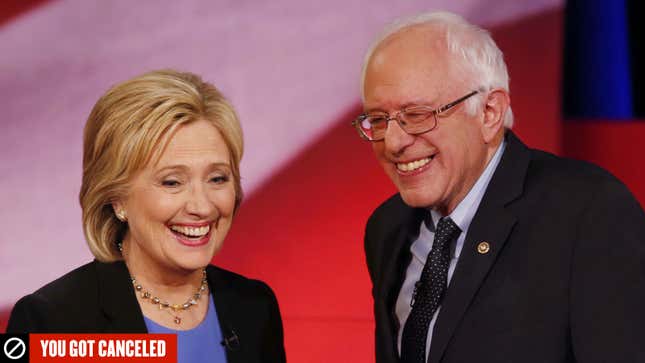The End of 'Bernie Would've Won'
Politics

Hillary Clinton’s defeat in the 2016 presidential election ushered in a slew of analysis trying to assess what the fuck happened: Did the Clinton campaign miscalculate the popularity of their messaging and reach in crucial swing states? Voter suppression? Right-wing nationalism reaching its predictable conclusion? Was it Russian interference? Sexism? Three years later, any reasonable person can safely conclude that the answer is all of the above.
And out of the anger, the dismay, the fear that followed November 8, 2016, came a bitter refrain repeated by those who supported Bernie Sanders, Clinton’s main competitor in the Democratic primary: “Bernie would’ve won.”
The idea was half cynical meme, half sincere lament, but it effectively poured salt on the post-election wound. Its central argument drew from early stats: Sanders gained more votes than Clinton in crucial states like Michigan and Wisconsin during the primary, which later turned red during the general. Additionally, Sanders was considered the anti-establishment candidate during a year when being anti-establishment was en vogue: Trump ran and won on it, and though he didn’t get the popular vote (Clinton shoulda won), his anti-establishment messaging proved victorious in a slew of swing states. And, by the end of the election, Sanders was a more popular politician than both Clinton and Trump.
Baseless leftist fantasy it is not, but it is an imperfect argument. It largely dismisses Clinton’s primary wins in swing states like Virginia, Nevada, Ohio, and Florida. Plus, it ignores the fact that the nature of a Democratic primary is very different from a ruthless general election, and that primary voting can be utterly chaotic and seemingly nonsensical. And much of the public opinion polling that painted Sanders as a positive alternative to Trump and Clinton were based on hypothetical scenarios, making voters’ answers tough to rely on.
Still, the “Bernie would’ve won” contingent was happy to draw on this alternate universe with an “I told you so” sneer after Clinton’s defeat. Left-of-center online circles had been beefing about Clinton and Sanders for over a year at that point; the meme elongated the brawl, providing another element of calamity to a chaotic post-election environment that had already reached its boiling point.
If only that was the end of it. In the years—yes, somehow it’s been years—since the 2016 election, “Bernie would’ve won” has remained both philosophy and shitpost, a cautionary tale against repeating some of the avoidable mistakes the Democratic Party made during the 2016 election and an easy way to get under the skin of people who still feel indebted to the spirit of the Clinton campaign.
But as much as I largely agree with the ethos behind “Bernie would’ve won,” I’m canceling it for 2019. The 2016 election and the online discourse that went along with it irreversibly rotted everyone’s brains. Nastiness and distrust have never been bigger virtues, and too many people are losing the plot. A useful identifier like “neoliberal” has become so abused that it has become trite, and criticizing milquetoast Democrats for supporting centrists’ policy agendas is now grounds for being called a Russian bot. One way to start to repair this is to leave the agonizingly 2016 sentiments in 2016 where they belong.
Plus, the idea that Bernie would’ve won 2016 is antiquated. Maybe Bernie would have won in 2016, sure. But Bernie Sanders could win the Democratic nomination in 2020, and even win the general election. Joe Biden has maintained a comfortable lead in national polls before he even threw his hat into the race, but Sanders is currently in second place nationally. He is leading in New Hampshire, trailing Buttigieg by just two points in Iowa, and is virtually tied with Elizabeth Warren in Nevada. He has withstood the fluctuating rise and fall of several of his competitors, survived a heart attack, and maintains the most loyal base of supporters of any candidate. Politico reports that his resiliency is finally making the so-called establishment take him and his candidacy seriously, and even pundits at large news outlets are acknowledging that there are some numbers in his favor.
Unfortunately, Sanders supporters have a reputation that precedes them, and that reputation is not that of racially and economically diverse men and women who want a functional healthcare system, a future without the obscene burden of student loan debt, and the end of endless war. Instead, it’s of a surly white leftist dude who treats leftism as a dick measuring contest. They’re not an accurate representation of Sanders’s base—despite pundits’ insistence on pushing this narrative—but they’re certainly out there, they’re certainly loud, and they’re certainly dicks. Unsurprisingly, they’re just as eager as the most obnoxious #Resistance tweeters to relive counterproductive 2016 battle lines, phrases, and conspiracy theories over and over again.
There’s too much work to do to get caught up in the same skirmishes on loop for another three years, especially as the most marginalized among us live under a state of increased harm. But for the Very Online Sanders supporters in particular, who used “Bernie would’ve won” in ways both sardonic and somber, this is a suggestion to send that phrase into retirement and continue to do what has to be done to do whatever is possible to turn “Bernie would’ve won” into “Bernie can fucking beat Trump, here’s why and here’s how.”